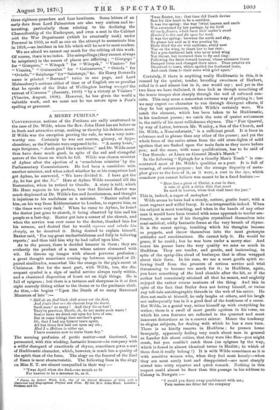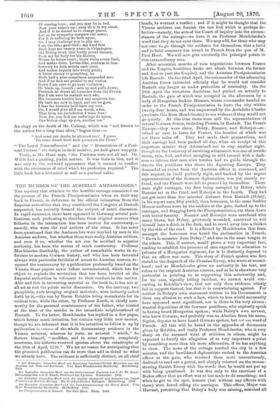A MERRY PURITAN.* CONVENTIONAL notions of the Puritans are sadly
overturned in the case of Dr. Wilde, whom the Rev. John Hunt has set before us in fresh and attractive array, making us thereby his debtors anew. If Wilde was the exception proving the rule, he was a very note- worthy one. Certainly he was not morose, gloomy, or hypo- chondriac, as the Puritans were supposed to be. " A merry heart," says Scripture, " doeth good like a medicine;" and Dr. Wilde must thus have done much good, in spite of the sad and changeful nature of the times on which he fell. Wilde was chosen minister of Ayhno after the ejection of a 'scandalous minister' by the Parliamentary Commissioners. He had been a candidate with another minister, and when asked whether he or his competitor had got Ayhno, he answered, " We have divided it. I have got the
Ay, he has got the No." Here at Ayhno 1Vilde remained till the Restoration, when he retired to Oundle. A story is told, which Mr. Hunt repeats in his preface, how that Richard Baxter was
much displeased at Dr. Wilde's fun and facetiousness, and thought it injurious to his usefulness as a minister. "Baxter called on him, on his way from Kidderminster to London, to reprove him, as ' the times were very dark.' When he came to Ayhno, he found
the doctor just gone to church, it being observed by him and his people as a fast-day. Baxter got into a corner of the church, and when the service was over came to the doctor, thanked him for his sermon, and desired that he would reprove and rebuke him sharply, as he deserved it. Being desired to explain himself, Baxter said, For my great uncharitableness and folly in believing reports ;' and then told him why he had called upon him."
As to the poems, there is decided humour in them ; they are evidently the product of a man whose nature simmered with wit. He throws up images with almost perverse profusion ; a great thought sometimes coming up between unpaired or ill- paired similitudes, somewhat like the orange in the pig's snout at Christmas. But for the most part, with Wilde, too, the dis- crepant symbol is a sign of useful service always ready within, and a chastened disposition of heart set on high things. He is full of epigram ; but there is a tartness and sharpness in it at first sight scarcely fitting either to the theme or to the puritanic cloth. As thus,—he begins " Upon the Death of so many Reverend Ministers of late":
" Still do we find black cloth wears out the first,
And fruits that are the choicest keep the worst.
Such men! so many ! And they die so fast !
They're precious, Death, oh, do not make such waste !
Scarce have we dried our eyes for love of one, But in come tidings that another's gone.
Oh, that I had my former tears again, All but those few laid out upon my sin ; Had I a Helicon in either eye, I have occasion now to verse them dry."
The seeming profusion of poetic matter—not tinctured, but permeated, with this winking, fantastic humour—iu company with a wilful disregard of exactitude of rhyme, sometimes gives a sort of Hudibrastic character, which, however, is much less a quality of the spirit than of the form. The elegy on the funeral of the Earl of Essex is most characteristic. The following lines in the elegy on Miss E. T. are almost unequalled in their way :—
" 'Twos April when she died,—no month so fit For heaven to be a mourner in, as it.
• Poems, by Robert Wilde, B.D., One of the Ejected Ministers of 1652, with a Historical and Biographical Preface and Votes. By the R2y. John Hunt. London: :Statham and Co.
'Twas Easter, too: that time did Death devise Best for this lamb to be a sacrifice.
It was the spring: the way 'twixt heaven and earth Was sweetened by her passage, by the birth early flowers, which burst their mother's womb olved to live and die upon her tomb.
It was the spring: between the earth and sky,
To please her soul as it was passing by, Birds filled the air with anthems, every nest Was on the wing, to chant her to her rest: Not a pen-feathered lark who ne'er tried wing Nor throat, but ventured then to fly and sing: Following the Saint toward heaven, whose entrance there Damped them and changed their notes. Then pensive air Dissolved to tears, which spoiled the feathered train, And sunk them to their nests with grief again."
Certainly, if there is anything really Hudibrastic in this, it is crossed by the quaint, tender, brooding sweetness of Herbert, rolled in it and almost lost in it, one would say ; and yet in the two lines we have italicized, it does look as though something of the ironic temper shot sharply through the veil of softened con- ceits. This may seem a somewhat extreme way of putting it ; but we may expect one character to run through divergent efforts, if they be but spontaneous, which Wilde's certainly were. We catch the element, which has been taken to be Hudibrastic, in his tenderest poems ; we catch the note of quaint seriousness in the rattle of his most rollicksome rhymes. The "Fair Quarrel, by way of Letter, between Mr. Wanley, a Son of the Church, and Dr. Wilde, a Nonconformist," is a sufficient proof. It is freer in reference and in phrase than any other of the poems ; and yet the whole force of the satire arises from the odd cross-lights of mild egotism that are flashed upon the main facts as they move before you ; and the same, with some qualifications, has to be said of " Iter Boreale: or Lines on General Monk's March."
In the following "Epitaph for a Goodly Man's Tomb" is con- centrated most of Dr. Wilde's qualities as a poet. It is full of meaning, of serious purpose ; but the strange disparity of meta- phor gives to the face of it, as it were, a cast in the eye, which somehow you cannot believe was meant to be a fixed feature :—
" Here lies a piece of Christ, a star in dust, A vein of gold, a china dish that must
Be used in heaven, when God shall feast the just."
This is, indeed, a caper of metaphor !
Wilde seems to have had a steady, serious, gentle heart, with a most vagrant and wilful fancy. It was irrepressible indeed. When his subject is most touching, and when in the hands of any other man it would have been treated with some approach to tender sen- timent, it seems as if his thoughts crystallized themselves into semi-satirical, oddly fantastic forms at the very breath of rhyme. It is the secret spring, touching which his thoughts become as puppets, and throw themselves into the most grotesque attitudes and combinations. He cannot help it. He would be grave, if he could ; but he was born under a merry star. And hence his poems have the very quality we miss so much in Hudibras. They are tender, and gentle, and insinuating, in spite of the spray-like cloud of burlesque that is often wrapped about their form. In his case, we see a most gentle spirit re- lieving itself from the pressure of serious service and trial threatening to become too much for it ; in Hudibras, again, you have something of the loud chuckle after the hit, as if the author had consciously attained all that he meant, and mightily enjoyed the rather coarse neatness of the thing. And this in spite of the fact that Butler does not betray himself, or twine any tell-tale autobiographic threads in the web of his satire. He does not smile at himself, he only laughs at others, and his laugh not uufrequently has in it a good deal of the huskiness of a sneer. But Wilde, in a genial way, mixes himself up with everything he writes ; there is a swell of most gentle egotism in his verse, on which his own features are reflected in the queerest and most innocent distortions as in a convex mirror. Hence the tendency to elegiac subjects, for dealing with which he has a rare turn. There is no kindly reserve in Hudibras ; he presses home brusquely, apparently feeling very much about men in general as Landor felt about critics, that they were like flies—you might crush, but you couldn't catch them (an epigram by the way, which is found in almost identical terms in Hazlitt ; to which of them does it really belong ?) It is with Wilde sometimes as it in with sensitive women who, when they feel most keenly—when they are most sorely hurt and disappointed—are most sharply stirred into witty repartee and quick remark. Nothing in this respect could almost be finer than this passage in his address to Calamy in Newgate
"I would you durst swap punishment with me ; Pain makes me fitter for the company
Of roaring boys ; and you may lie in bed, Now your name's up ; pray do it in my stead. And if it be denied us to change places, Let us for sympathy compare our oases; For if in suffering we both agree, Sir, I may challenge you to pity me: I am the older gaol-bird ; my hard fate Hath kept me twenty years in Cripplegate. Old Bishop Gout, that lordly proud disease, Took my fat body for his diocese, Where he keeps court ; there visits every limb, And makes them, Levite-like, conform to him.
Severely he cloth article each joint, And makes inquiry into every point ; A bitter enemy to preaching, he Hath half a year sometimes suspended me; And if he find me painful in my station Down I am sure to go next visitation ; He binds up, looseth ; sets up and pulls down ; Pretends he draws all humours from the Crown.
But I am sure he maketh such ado, His humours trouble head and members too: He hath me now in hand, and ere he goes, I fear for heretics he'll burn my toes.
Oh, I would give all I am worth, a fee, That from his jurisdiction I were free !
Now, Sir, you find our sufferings do agree, One bishop clapt up you, another me."
An elegy on the death of Mr. Calamy, which was " not known to the author for a long time after," begins thus :— " And must our deaths be silenced too ? I guess
'Tie some dumb devil hath possessed the Press."
41 The Loyal Nonconformist" and the " Recantation of a Peni- tent Proteus " are unique in their incisive, yet half-grave waggery.
Truly, as Mr. Hunt says, "the Puritans were not all sad. Dr. Wilde had a gushing, joyful nature. It was born in him, and it was only to the outward appearance that it seemed to conflict with the seriousness of mind which his profession required." The little book has a historical as well as a poetical value.































 Previous page
Previous page